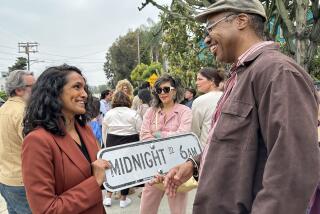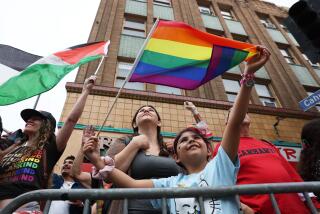DOMA, John Rechy and the land of the free
John Rechy should be proud. It was his 1963 novel “City of Night” — the story of a gay street hustler that took place, in part, in downtown’s Pershing Square — that helped carve out a place for gay writing in American literature.
And yet, when I heard this morning that the Supreme Court had overturned a key provision of the Defense of Marriage Act (as well as sending Proposition 8 back to a federal district court in California), I couldn’t help remembering another piece of Rechy’s writing, the nonfiction book “The Sexual Outlaw,” which includes a vivid account of a 1976 Hollywood gay pride parade.
Rechy has always defined himself as an outsider, whether as a gay man in a straight-dominated society, or as an outlier in gay culture itself. “I would not march in the parade,” he wrote back then. “I wanted an overview, wanted to move, listen, see, absorb it all — and besides, I don’t really like ‘joining’ anything.”
At the same time, Rechy couldn’t help but marvel that the parade was taking place at all, in a city where “[e]ven ten years ago, a cop might bust you for holding same-gender hands in public. It all still seemed too far out for many — hadn’t the dinosauric Los Angeles Herald-Examiner lamented editorially the week before that so horrendous a time had arrived as would permit — on independence day! — a parade of perverts?”
Parade of perverts? That such a phrase could once appear on the editorial page of a major metropolitan daily is a reminder of just how far we’d come even before this morning’s Supreme Court decisions, but also of how far we have to go.
Rechy makes the point explicit by claiming Hollywood Boulevard as something of an open territory — “[s]ite of how many gay battles fought cruising and hustling, … [b]ought with how many cop interrogations and trips to jail to be hassled, questioned, booked, held, charged?” — as if, in so doing, he could actually make it so.
This, of course, is the first lesson of liberation politics: Take charge of the future by reframing the present, defining it on your own terms. I think of Abbie Hoffman, who once declared, “The ground you are standing on is a liberated zone. Defend it.” Or anarchist visionary Hakim Bey and his “Temporary Autonomous Zone,” a little piece of free space we each carry around, always.
I also think of Vaclav Havel, who back in the bad old days of the Iron Curtain posited what he called a “second culture,” in which to live as if one were free paradoxically made one free, because it unlocked the shackles of the mind.
It’s what Rechy is suggesting, too, as he acknowledges when he writes about “the itchy sentiment that signals real pride.” He goes on: “Here you are, and here they are, and here we are. I remember Ma Joad’s proud speech of the Okies’ eventual triumph in ‘defeat.’ We keep coming, she said, because we’re the people.”
Rechy’s account of that long-ago parade ends in violence, when the police, as is not wholly unexpected, move in. Yet even here, Rechy finds something, some whisper of a new world, in the reaction of the marchers, who refuse to be afraid.
“Hands tightening on their sticks,” he observes, “the cops tensed perceptibly forward. What was happening? … Nothing in their cop training — no, nothing in their lives — had prepared them for this. Gay men and women not afraid of them? Imagine! … What … was happening here?”
This is the key passage, and what reverberates (all the way to the Supreme Court) is its dignity, its message of self-assertion and the power of the imagination: in other words, what it takes to dream the future into being.
ALSO:
20 classic works of gay literature
Gay marriages to resume in Calif.
Supreme Court strikes down DOMA, dismisses appeal of Calif. Prop 8
More to Read
Sign up for our Book Club newsletter
Get the latest news, events and more from the Los Angeles Times Book Club, and help us get L.A. reading and talking.
You may occasionally receive promotional content from the Los Angeles Times.







